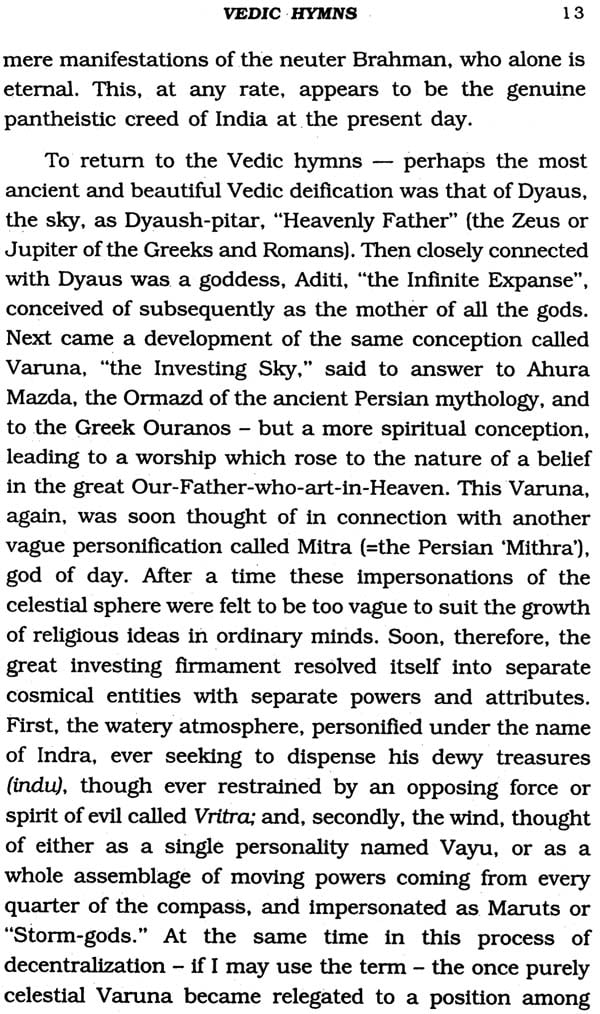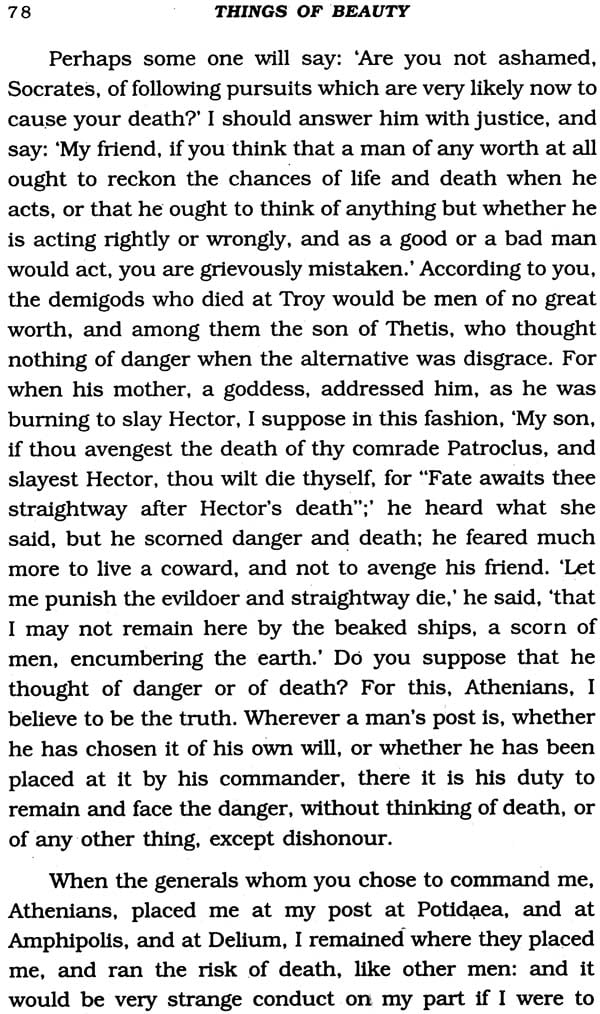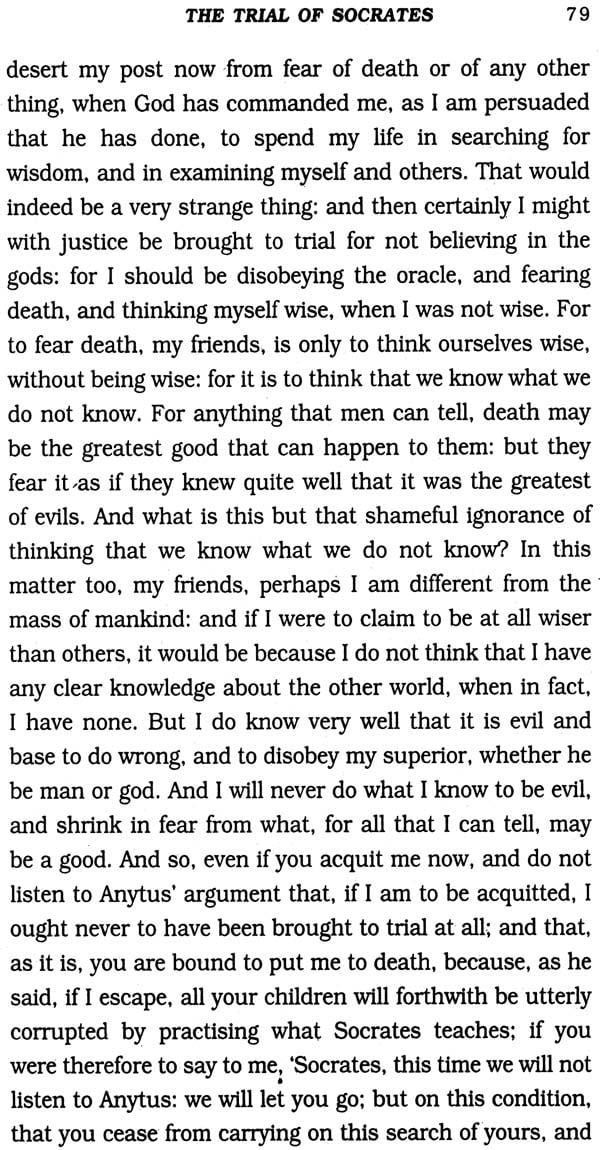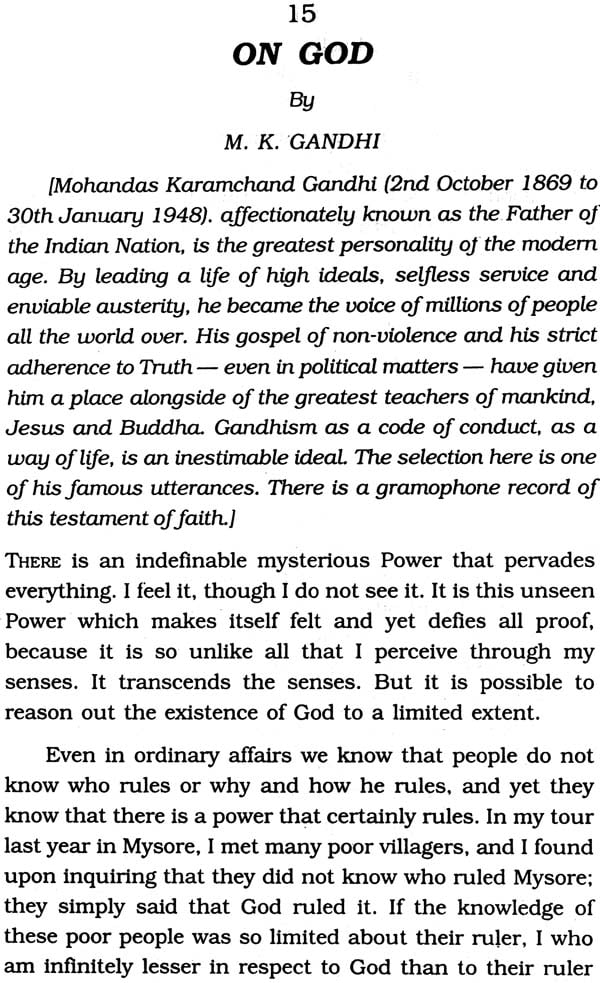
Things of Beauty (An Anthology fo the Wit and Wisdom of Ancient, Medieval and Modern Thinkers and Writers)
Book Specification
| Item Code: | NAO913 |
| Author: | V.N. Bhushan |
| Publisher: | Bharatiya Vidya Bhavan |
| Language: | English |
| Edition: | 2001 |
| Pages: | 232 |
| Cover: | Paperback |
| Other Details | 8.5 inch X 5.5 inch |
| Weight | 280 gm |
Book Description
The comprehension and appreciation of beauty, and the pursuit and realization of beauty, have always been regarded as among the highest primary aspirations of the human being. Ancient India thought equated beauty (sundaram) with truth (satyam) and goodness (shivam)- all the three forming the facets of the Divine. The fundamental concept of Beauty-whether it be in the East or in the West, whether it be that expatiated upon by Hindu philosophers or by Plato or by Shelley or by Keats- has something sacred, if not celestial, ablut it. Manifold are the manifestations of Beauty-through Nature, through colour, sound. movement, Indeed, beauty is coeval with the world, co-extensive with time and space, pervading the seen and to unseen; it is the origin of the Universe and the vital sustainer of the world.
Beatty is not that which simply tickles our senses or yields us momentary pleasure. It is not that which merely comprises of symmetry, variety and colour. It is not a mere reconciliation of matter and sensation on the one side with intellect and spirit on the other. Nor is it a thing of intellectual content and aesthetic experience. Beauty includes all this, and at the same time is above and beyond all of them. beauty cannot be explained by any formula or illustrated by any figure; not that beauty is elusive but that it inflicts on man everlasting defeat! Tennyson’s pregnant utterance that Beauty, Truth and Knowledge are three sisters that dote upon each other, friends to man, Living together under the same roof, and never can be sundered without tears-gives us some idea of beauty, whose instinct only the soul of man can touch. Considerations-whether beauty is subjective or objective, or intrinsic or extrinsic, or emotive or symbolic, or whether it is that which is psychological or useful-are all irrelevant. As W.B.Yeats said, we can see in all poor foolish things that live a day eternal beauty wandering on her way. An inflow of the Infinite within the finite, a revelation of the absolute in the relative within the finite, a revelation of the Absolute in the relative-Beauty is like a bell that calls us to the sanctuary of the soul!.
By common consent, literature-the noble thouhts and dreams of choice spirits and master minds-occupies a place of honour among the arts that deal with and disclose the beautiful. The literary artist is primarily a creator- a creator of beautiful. The literary artist is primarily a creator –a creator of beauty-out of the discords of the Universe. Loving the ‘principle of beatuty in all things’- the literary artist sees beyond the coloured dome of appearance-sees the beatific vision of the pure white radiance of Being. Tuning his reed to beautiful things take their quality-he moves to his utterance:
we who with songs beguile you pilgrimage And swear that Beauty lives tho’ lilies die, We poets of the pround old lineage Who sing to find your hearts we know not why.
From the dim dawn of history the enlightened minds of all countries and of all ages have countries not a little to the treasure of sentential lore-which has proved to be a veritable gold mine of beauty, truth and wisdom. Whether it be the Sacred Books of the East or the Religious Texts of the West, the aphorisms of ancient writers or the apothegms of the medieval ages or the variegated thoughts of more recent times-we find in all of them an inexhaustible source of entertainment, enlightment, and inspiration. Embedded in them we find important aspects of divine goodness, of juman nobility and dignity, of moral wisdom, of benevolence and virtue, of political or personal prudence, and ‘those truths in action which are as unchangeable, mighty, and palpable as the laws of Nature, and which will continue so to the end of the world’.
From such an invaluable tide-drift of the centuries here is presented in a manageable and purchasable form an enwrapment of fadeless splendor. Seekers of beauty and of flowers of intellect, searchers of pearls of thought, adventurers for gems of wisdom-all will find in these pages something to touch the heart or to thrill the mind, to widen knowledge to broaden sympathy. Songs and chants, fables and parables, epigrams and maxims, stories and essays, poems and plays-are spread here as in a feast for the connoisseur as well as for the common reader. The selections in these pages contain ‘records of great and benign in soothed or darkened their journey along the multitudinous ways of life.’ All these constitute that body or literature which, in its largest sense,’is the weaving or unwinding of those counter-threads-white or black-which guide the march or feed the courage of all those who toil amid the pitfalls where darkness frowns, toward the Delectable Mountains, where brightness reigns, towards the Delectable Mountains where brightness reigns.’Pagan faith, Hebrew thought, Vedic wisdom, Greek beauty, Roman grandeur, Christian Charity, Persian roses. rhetorical flourishes and poetic facilities- all these are here floating as it were on the beautiful full tide of their own undying excellence-promising, ‘to bring sun-shine into our hearts of the choicest thinkers and writers-a bonquest of beautiful things-afford the reading and help own undying excellence-promising,’to bring sun-shine into our hearts and to drive moonshine out of our heads.
May this anthology of some of the best and brightest thoghts of the choicest thinkesr and writers-a bonquest of beautiful things-afford the reader many an hour of agreeable and instructive reading and help him to cultivate social virues, pleasures of the intellect and the imagination, and the pure delight that fills the human heart with joy profound and peace perennial! Things of beauty are verily a joy forever!
| Kulapati's Preface | v | |
| Author's Preface | ix | |
| Acknowledgements | xiii | |
| 1 | The Assyrian story of the creation | |
| -Rev. A.H.Sayce | 1 | |
| 2 | Vedic Hymns | |
| Sir Monier-Williams | 10 | |
| 3 | Love Stronger Than Death | |
| (The Story of Savitri | ||
| Protap Chandra Roy | 29 | |
| 4 | Aesop's fables | |
| Retold by Phoedrus | 49 | |
| 5 | Greece And Rome | |
| P.B shelley | 58 | |
| 6 | Anecdotes And Aphorisms | |
| Diogenes Laertius | 61 | |
| 7 | The Trial Of Socrates | |
| Plato | 66 | |
| 8 | On Anger | |
| Seneca | 88 | |
| 9 | Mixims of Epictetus | |
| T.W.Rolleston | 107 | |
| 10 | Apologues And Morals from The Gulistan | |
| Sa'di | 123 | |
| 11 | Of The Liberty Of Subjects | |
| Thomas Hobbes | 137 | |
| 12 | What Is Religion? | |
| Swami Vivekananda | 149 | |
| 13 | The Realisation Of Beatuy | |
| Rabindrandath Tagore | 162 | |
| 14 | The Problem Of Life | |
| Shri Aurovindo | 169 | |
| 15 | On God | |
| M.k.Gandhi | 184 | |
| 16 | The Bhagavadgita | |
| S. Radhakrishnan | 188 | |
| 17 | Ashoka, The Beloved Of The Gods | |
| Jawaharlal Nehru | 194 | |
| 18 | Social Foundationas OF Indian Culture | |
| K.M.Munshi | 202 |











